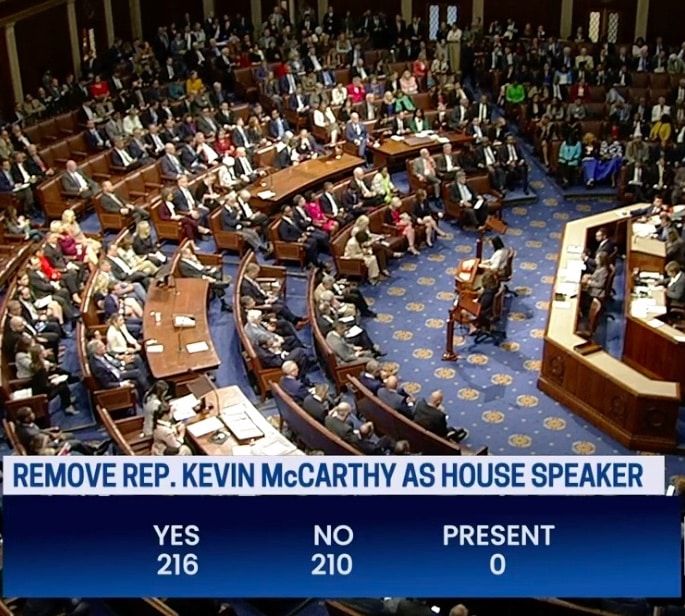The House of Representatives on Tuesday voted in favor of a motion to vacate Speaker Kevin McCarthy (R-CA) from his leadership position.
The vote was 216 in favor and 210 against the motion.
Several members did not vote, including Speaker Emerita Nancy Pelosi (D-CA) was escorting the remains of the late Sen. Dianne Feinstein back to California.
The vote was set after far-right Rep. Matt Gaetz (R-FL) on Monday evening made good on a threat to file a motion to vacate McCarthy from the Speakership, hours after he had accused McCarthy of having struck a “secret side deal” with President Biden and House Democrats to continue to fund Ukraine in its war against Russia.
Gaetz’s motion also came two days after McCarthy had introduced a “clean” 45-day stopgap spending bill to keep the government funded and avoided a shutdown; it passed in the GOP-led House after receiving more votes from Democrats that Republicans.
A motion to vacate is essentially calling for a “no confidence” vote against the House Speaker to have him or her ousted. There’s never been a successful vote to oust a House Speaker in the history of the U.S. Congress.
However, a concession McCarthy made to far-right House members like Gaetz in January to secure the Speakership allows just one Representative—in this case, Gaetz—to make a motion to vacate the chair. Before McCarthy, a motion to vacate required a majority vote from members of the Speaker’s party.
Ahead of the vote Tuesday, McCarthy told reporters he was not counting on Democrats to help him save his job though he conceded, given Republicans’ razor-thin four-seat majority in the chamber, that “if five Republicans go with Democrats, then I’m out.”
By that point in the day, there were already a reported five conservative Republicans, including Gaetz, who were leaning toward voting for McCarthy’s ouster.
And House Democrats, who’d held a meeting earlier in the morning, had decided they were “not voting in any way that would help save Speaker McCarthy,” according to Rep. Pramila Jayapal (D-WA), leader of the House Progressive Caucus.
A vacancy in the Speaker’s chair essentially paralyzes the House until a successor is chosen, according to multiple procedural experts.
While McCarthy can, in fact, run for Speaker again, an interim Speaker would first be chosen from a list prepared by McCarthy and his staff at the beginning of the Congressional term, but staff intimately familiar with House rules have told the New York Ties that the role of that person would be to oversee a new Speaker election and little more.
After the vote, Rep. Patrick McHenry (R-NC) was appointed Speaker Pro Tempore.


